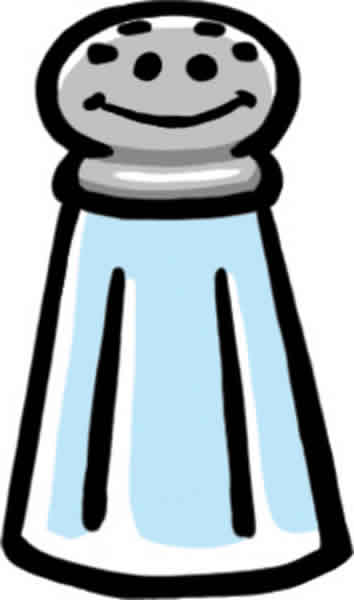Common salt is a deadly poison. The only difference between this and other commonly known poisons is that one has to administer rather large quantities to kill with it. One or two teaspoonfuls of salt would not kill an adult but can easily kill a 6 month old baby. Come to think of it, even an adult can be killed with common salt. Only he would have to be fed larger quantities. About 40 teaspoons of common salt would kill an adult human being too.
Most foods in their natural state contain sodium. But most sodium in our diet is added to food while it's being commercially processed or prepared at home. That's why you need to be aware of both natural and added sodium content when you choose foods to lower your sodium intake. When buying prepared and prepackaged foods, read the labels. Many different sodium compounds are added to foods. These are listed on food labels. Watch for the words soda and sodium and the symbol Na on labels — these words show that sodium compounds are present.
Don't think that just because the FDA deems salt as safe, that it is...they are the organization who tell us that pharmaceutical drugs which have killed many people are safe as well!
If you are going to use salt, use only natural, unprocessed forms, such as Himalayan salt, or pure sea salt, unrefined in any way.
Some info. on various salts
FDA Considering Safety of Salt
________________________________________
Because of its negative health impacts, salt should no longer be considered safe, and it's generally recognized as safe (GRAS) status should be revoked, according to a petition by advocacy group Center for Science in the Public Interest (CSPI) filed with the U.S. Food and Drug Administration (FDA).
The FDA has scheduled a hearing in response, where they will discuss revising their salt regulations, along with the implications of doing so.
In its petition, CSPI has recommended that:
• Limits be put on the amount of salt in processed foods
• Health messages related to salt be limited
• Salt be treated as a food additive, not GRAS
Eating too much sodium has been linked to high blood pressure and heart disease. More than three-quarters of the salt in the average American diet comes from processed foods.
CSPI has petitioned the FDA about its salt regulations in the past, as well. In 1978 they asked for limits for sodium in processed foods, and in 1981 they suggested adding warning labels on packages of salt that weighed more than half an ounce. Both petitions were denied.
At the FDA's hearing, scheduled for November 29, 2007, policies regarding salt and sodium will be discussed, and comments on current and potential future approaches will be taken.
Salt may affect more than blood pressure: study
________________________________________

Thu Apr 19, 2007
Reuters Limited
Consuming less salt can not only lower blood pressure, but may reduce the risk of heart disease overall, researchers reported on Thursday.
They found that people with borderline-high blood pressure who reduced their sodium intake by 25 to 35 percent lowered their risk of total cardiovascular disease by 25 percent. And this lower risk lasted for 10 to 15 years.
Dr. Nancy Cook and colleagues at Brigham and Women's Hospital and Harvard Medical School in Boston studied more than 3,000 people who took part in a study of a low-salt diet and its effects on high blood pressure.
Those who were assigned to a low-salt diet had a lower risk of all various kinds of cardiovascular disease even 10 to 15 years later, they report in the online version of the British Medical Journal.
They were also 20 percent less likely to have died than people assigned to a normal diet.
"Our study provides unique evidence that sodium reduction might prevent cardiovascular disease and should dispel any residual concern that sodium reduction might be harmful," they wrote.
Salt intake is clearly linked to high blood pressure and the National Heart, Lung and Blood Institute, which paid for the study, recommends that Americans cut down on sodium.
More than 65 million U.S. adults — one in three — have unacceptably high blood pressure, above levels of 140/90, the NHLBI said. Another 59 million have prehypertension — defined as blood pressure of 120/80 or above.
The average U.S. and British diets contain far more than the 2,300 mg daily recommended by the NHLBI and expert groups.
Cook's team said salt may affect artery and heart health by ways that go beyond blood pressure. Sodium may make blood vessels less able to expand and contract and may toughen heart cells, they said.
Mountain of Salt-At the dead~Salt Sea in Israel. by Mony
Note from Mony Vital:
Salt is one of the most harmful substances which affect our cells on a daily basis. Salt is an aging substance, when used in excess, causes dysfunction and death in the cells and can create pain in tissue where it accumulates.
All types of salt, no matter the origin or processing, are bad for your health. Never add salt to your food. Every substance in the world already has all the salt needed to keep us alive.

 Xin email tới:
Xin email tới: 